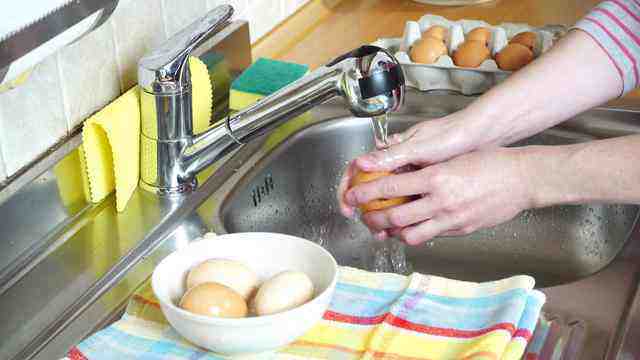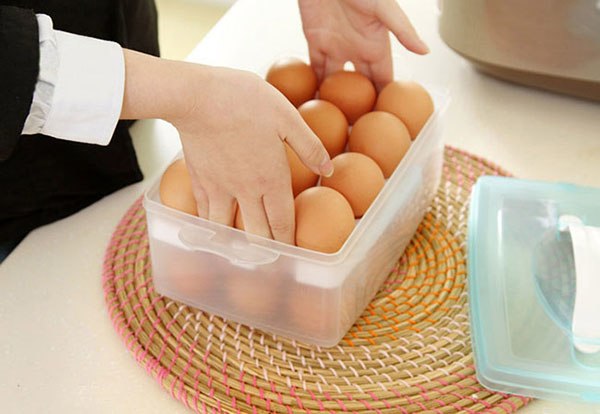Risk of infection from egg preservation
The risk of poisoning can come from Salmonella bacteria found in animal products, especially poultry eggs.
When hens lay eggs, there is a protective film on the eggshell that prevents bacteria from entering. Many people buy eggs because they think to keep them clean, so they carefully wash the eggs and then put them in a box and store them in the refrigerator. However, doing this inadvertently causes the eggs to lose this protective layer and the eggs are at risk of being contaminated with Salmonella.
On the other hand, when storing eggs in a refrigerator, care should be taken when removing them from the refrigerator because eggshells can condense due to changes in location and temperature. This condensation facilitates the growth of germs.

Washing eggs will lose the protective film that makes eggs susceptible to infection.
How to properly store eggs
To keep eggs in the best condition, you must follow some necessary rules such as keeping them away from moisture, light and air for 3 weeks.
Place the eggs in the box and cover with a thick layer of newspaper. This will make the eggs immune to temperature changes and keep their quality longer.
There are various advices on whether to store eggs in the refrigerator, the answer is simple: if the temperature is below 20°C, it is not necessary. You can keep them in a box, cover with newspaper, or wrap the eggs in newspaper to prevent moisture.
When the outside temperature exceeds 20°C, it is imperative to store eggs in the refrigerator, below 8°C. If you want to store eggs in the refrigerator, place them facing down. Eggs should not be left with fruit, meat, or fish to avoid contamination.

Storing eggs in a container away from moisture and heat will help them stay fresh longer.
Some people also wonder when breaking eggs without using whites or yolks and want to preserve it, how to preserve it. Experts say that raw egg yolks can be kept in the refrigerator for 1-2 days as long as you store them in an airtight container.
Alternatively, you can also freeze egg yolks and keep them for up to 4 months. To keep the yolks from turning scum, add 0.5g of salt or 7g of sugar. Place the yolks in a container with cling wrap and cover tightly. You should note the date, number of yolks and preservatives (salt or sugar) on the outside of the box for easy processing. To defrost and use egg yolks in sweet or savory recipes, place them in the refrigerator or under cold running water.
As for the whites, if you store them in an airtight container in the fridge, they can be used within 5 days. You can also separate the egg whites and place them in an ice tray to freeze. Then put them in a freezer bag or sealed container. You will use it from 5 days to 4 months. Frozen egg whites should be cooked in meringues, macaroons, yogurt cakes…
Eggs sold in the market are considered fresh eggs. Eggs that can be consumed within 28-30 days are still considered safe if stored properly. When buying eggs in the supermarket, you should look at the recommended date of use (DCR) listed on the box, or printed directly on the shell of the egg. It is important to store eggs in good condition so that they do not spoil before the recommended time.
at Blogtuan.info – Source: Eva.vn – Read the original article here



